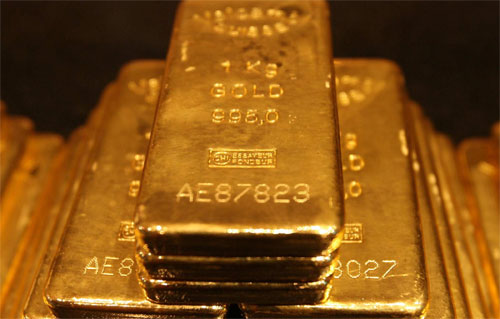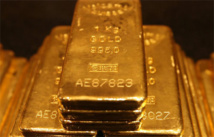Canada has completed a very long process. Even in 1955, the country had 1,088 tons of gold. By 2000, it was 22 times less: only 48 tons. Today, there’s only 2 kilos left in the Bank of Canada. The country now takes last place in the world stocks ranking of World Gold Council, significantly lagging behind Albania, Haiti and Papua New Guinea.
Bank of Canada explained their action by the fact that gold bullion are obsolete and illiquid compared to, say, the US Treasuries. There is some logic: it’s indeed easier to find buyers for the US bond at par value, compared to looking for someone to buy the heavy precious metal. However, scientists at the University of Santa Cruz show counterargument: the real economy is not always just rules of the market and statistical data.
The survey showed that all countries with large reserves of gold once were (or are) a global hegemony, an empire or an important trade center. There are cases where countries, which have accumulated gold, seek for such status, even though previously they did not showed such ambitions. The study even introduces the concept of "global power" - it is not quantity-related, but is correlated with the gold reserves.
Not surprisingly, the US remains the world's largest economy, and the dollar - the most popular currency, despite the gold standard’s abolition. The Netherlands is home to only 17 million people, while it takes 10-th place in terms of gold reserves. In the XVII century, it was a real business empire. Today, salt, dried fish and poppy bulbs seem to be mundane goods, yet one could control the world with their help just several hundred years ago. Just like nowadays - by means of oil.
One may call it imperial ambitions and retrograde chauvinist, but there is still a healthy desire to win in the competition. By its gold reserves, Finland got stuck somewhere between Argentina and Bolivia. Ireland - even lower, between Latvia and Lithuania. These countries are used to living in the shadow of large empires, and they all share the sad story of his conquests by the ambitious neighbors.
The most vivid example of persistent newcomers in the top 20 are China and India. The first has increased its reserves to 1,763 tons and surged to the 6th place. India ranks 11th place in the list. China had been a cradle for a great dynasty long before the Netherlands or the US were formed, and India in general gave start to the modern Western civilization. Judging by the number of gold (and common indicators, such as GDP growth), the status of China and India in the international arena will soon come to a qualitatively new level. It is obvious, even despite the fact that a few decades ago, the authorities of these countries did not think about gold and influence on international politics, but how to put at least a bowl of rice on the table of every citizen instead.
As for Canada - more recently, the country has elected the new Prime Minister Justin Trudeau. The first thing he did was to refuse to build the Keystone XL pipeline, which was to pass through the United States and to allow Canadians to export its oil to international markets via sea terminals. Stephen Harper, Trudeau’s predecessor, used to constantly remind to States about the draft. However, the new prime minister thinks that these reminders spoiled the good relations and the US-Canadian business climate.
Due to infrastructure problems, Canada is still forced to sell oil primarily only to the United States. American friends take advantage of this and enjoy a huge discount: even in the era of $ 80 per barrel, Canadian crude sometimes went for $ 20 to the US. Such ambitions of Justin Trudeau lovely correspond to two kilograms of gold in a huge vault of the Central Bank of Canada.
source: smh.com.au
Bank of Canada explained their action by the fact that gold bullion are obsolete and illiquid compared to, say, the US Treasuries. There is some logic: it’s indeed easier to find buyers for the US bond at par value, compared to looking for someone to buy the heavy precious metal. However, scientists at the University of Santa Cruz show counterargument: the real economy is not always just rules of the market and statistical data.
The survey showed that all countries with large reserves of gold once were (or are) a global hegemony, an empire or an important trade center. There are cases where countries, which have accumulated gold, seek for such status, even though previously they did not showed such ambitions. The study even introduces the concept of "global power" - it is not quantity-related, but is correlated with the gold reserves.
Not surprisingly, the US remains the world's largest economy, and the dollar - the most popular currency, despite the gold standard’s abolition. The Netherlands is home to only 17 million people, while it takes 10-th place in terms of gold reserves. In the XVII century, it was a real business empire. Today, salt, dried fish and poppy bulbs seem to be mundane goods, yet one could control the world with their help just several hundred years ago. Just like nowadays - by means of oil.
One may call it imperial ambitions and retrograde chauvinist, but there is still a healthy desire to win in the competition. By its gold reserves, Finland got stuck somewhere between Argentina and Bolivia. Ireland - even lower, between Latvia and Lithuania. These countries are used to living in the shadow of large empires, and they all share the sad story of his conquests by the ambitious neighbors.
The most vivid example of persistent newcomers in the top 20 are China and India. The first has increased its reserves to 1,763 tons and surged to the 6th place. India ranks 11th place in the list. China had been a cradle for a great dynasty long before the Netherlands or the US were formed, and India in general gave start to the modern Western civilization. Judging by the number of gold (and common indicators, such as GDP growth), the status of China and India in the international arena will soon come to a qualitatively new level. It is obvious, even despite the fact that a few decades ago, the authorities of these countries did not think about gold and influence on international politics, but how to put at least a bowl of rice on the table of every citizen instead.
As for Canada - more recently, the country has elected the new Prime Minister Justin Trudeau. The first thing he did was to refuse to build the Keystone XL pipeline, which was to pass through the United States and to allow Canadians to export its oil to international markets via sea terminals. Stephen Harper, Trudeau’s predecessor, used to constantly remind to States about the draft. However, the new prime minister thinks that these reminders spoiled the good relations and the US-Canadian business climate.
Due to infrastructure problems, Canada is still forced to sell oil primarily only to the United States. American friends take advantage of this and enjoy a huge discount: even in the era of $ 80 per barrel, Canadian crude sometimes went for $ 20 to the US. Such ambitions of Justin Trudeau lovely correspond to two kilograms of gold in a huge vault of the Central Bank of Canada.
source: smh.com.au



















